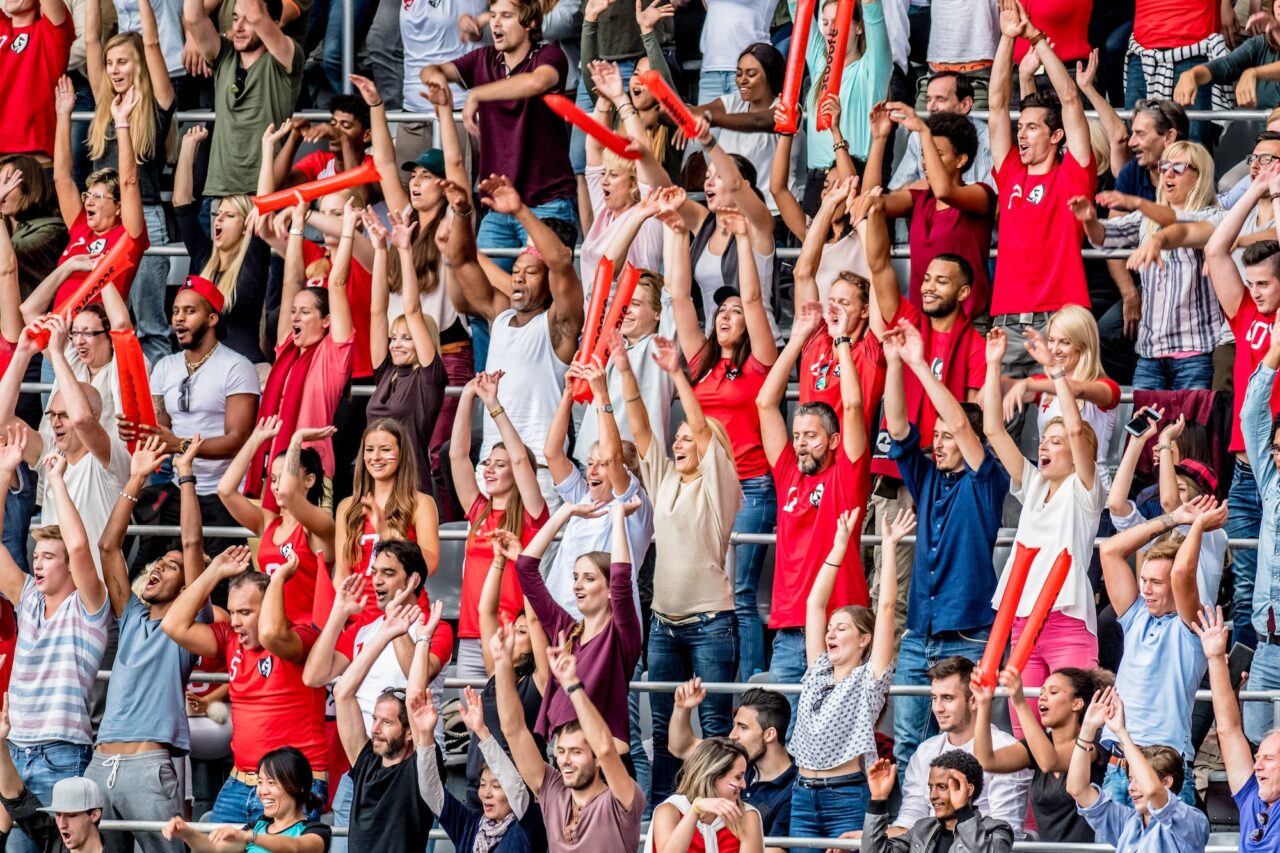Stadiums get loud: the crowd, the announcer blaring over the speaker and the loud music. This makes for the fun, energetic atmosphere we love about watching sports. If you’re planning on going to a game or you regularly attend your local team’s games, you may be wondering about the noise levels in the stadium. Is it loud enough to cause hearing loss?

Can Loud Noise Damage Hearing?
Yes, loud noise can damage hearing. In fact, it’s one of the leading causes of hearing loss today. Any exposure to loud noise can damage hearing, whether it’s a single sudden sound or sustained exposure to loud noise over a long period of time. When hearing is damaged by loud noise exposure, it’s known as noise-induced hearing loss, or NIHL.
How Loud Is Too Loud?
Distance is measured in inches and miles; time is measured in seconds and hours. When measuring sound levels, we use the unit “decibels,” or dB. The American Academy of Audiology has published this chart as a guide to decibel levels and what is too loud. Sounds at 85 dB and above have the potential to damage your hearing.
Volume in the loudest football stadiums can reach 110 dB. Indoor sporting events, like basketball or hockey, get even louder because their arenas echo the sound instead of releasing it. The Guinness World Record for the loudest NFL crowd was set by Kansas City Chiefs fans in 2014. The roar of the crowd was measured at 142.2 decibels! At levels like that, it only takes one game to damage your hearing. If you attend games regularly, your chances increase significantly.
How Does Loud Noise Damage Hearing?
Inside our ears, in an organ called the cochlea, are sensory cells that read sound waves, translate them into electrical impulses and transmit those electrical impulses to the brain for processing. Sensory cells near the front of the ear detect higher-pitched sounds, and the sensory cells further in detect lower-pitched sounds.
These sensory cells are fragile, and when sound waves are especially powerful, their force can bend, break or damage the cells. It’s just like stomping on grass. After you lift your foot back up, some grass blades pop back up, while others remain trampled on the ground. Unlike grass, sensory cells in our ears do not regenerate, so damage is permanent.
When the sensory cells sustain damage, they are no longer able to transmit sound information to the brain. Our ears may collect sound waves, but it is in the brain where hearing truly happens. If the sound information cannot reach the brain, you won’t perceive or hear the sound. Because the cells that detect higher pitches are near the front of the channel, they often bear the brunt of the force and take the most damage.
How Will I Know if My Hearing Is Damaged?
You may have damaged your hearing if sounds seem muffled, you have trouble understanding conversations, especially if you’re in an environment with a lot of background noise, or you experience a plugged-up feeling in your ear or even ear pain. You may also experience a temporary threshold shift, tinnitus or hyperacusis.
Threshold Shift
A threshold shift is a reduction in hearing sensitivity that occurs immediately after exposure to loud noises. Your auditory threshold is the quietest sound level you can hear at a baseline level. During a threshold shift, you will have more difficulty hearing quiet noises. Threshold shifts may also cause your ears to feel full or stuffy.
During a threshold shift, your ear may react to loud noise by deactivating some of the sensory cells in the cochlea, particularly the ones near the front, to protect them from damage.
Tinnitus
Damage to cochlear sensory cells can also cause tinnitus, which is often called “ringing in the ear.” If you return home from your sporting event and your ears are ringing or you hear a humming or buzzing sound, you’re experiencing tinnitus. This occurs because those deactivated or damaged sensory cells send incomplete information to the brain, which it misinterprets as a ringing sound.
Hyperacusis
Hyperacusis is a type of sound sensitivity. People with hyperacusis perceive everyday background noise, like people chatting or birds chirping, as unbearably loud. Hyperacusis causes a physical reaction in the body to background noise, even physical pain in severe cases.
What Can I Do to Protect My Hearing While at a Sporting Event?
This information isn’t meant to discourage you from seeing your favorite teams play. We do, however, want to encourage you to be proactive in protecting your hearing when you go. Here are some tips to make sure you enjoy the game to the fullest while still protecting your hearing health.
- Wear hearing protection, like earplugs or earmuffs.
- Take regular breaks away from the noise.
- Try to get some distance between your body and the speakers when choosing a seat.
- Rest your ears by avoiding louder noise for a day or two after the sporting event.
- Book an audiology appointment if you’re experiencing a change in hearing.
Enjoy the game, and call North Alabama ENT Associates if you need more information on protecting your hearing!